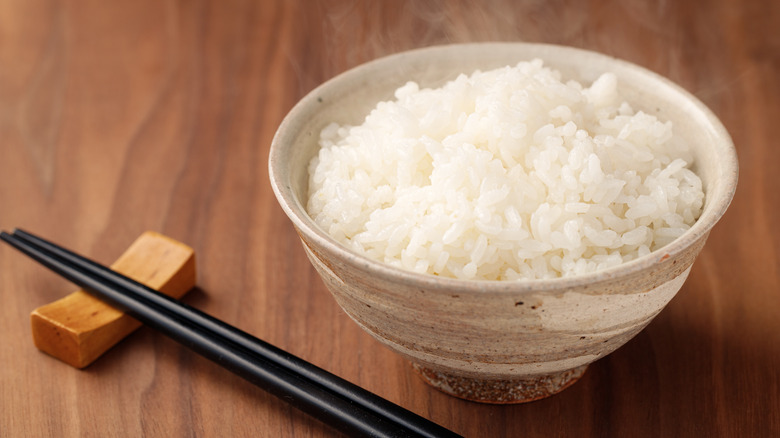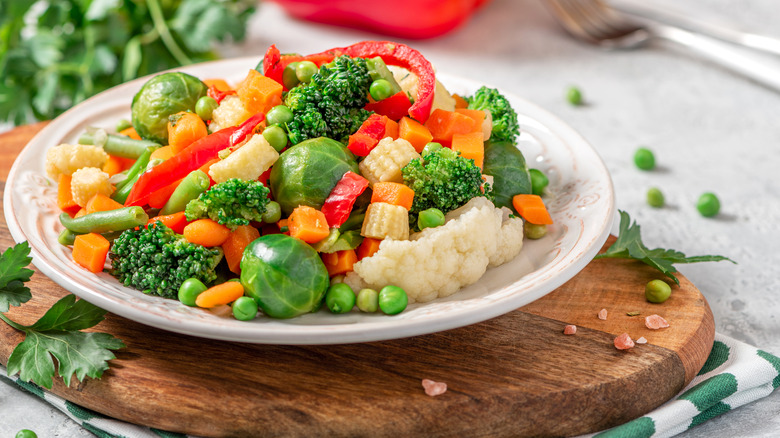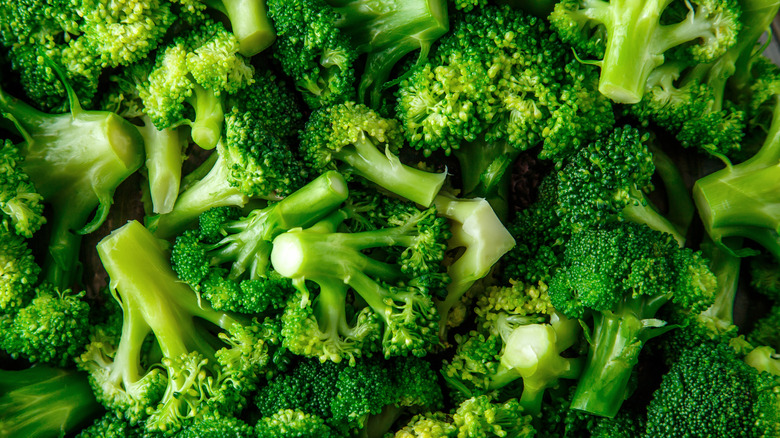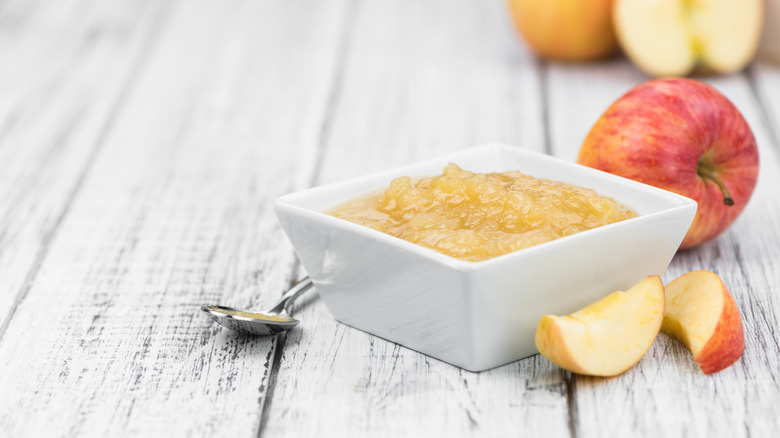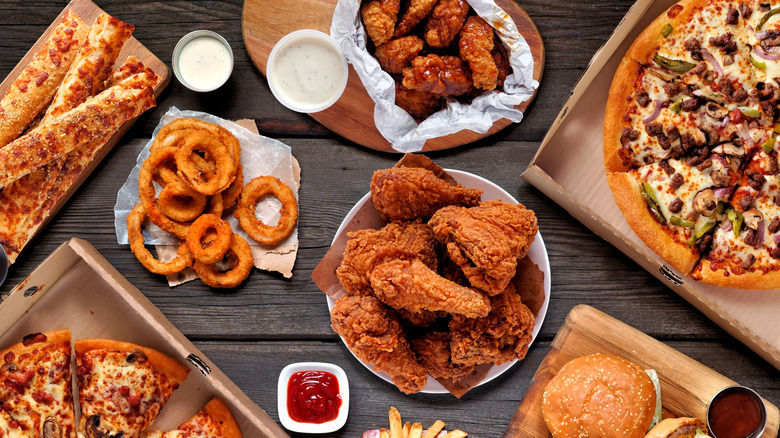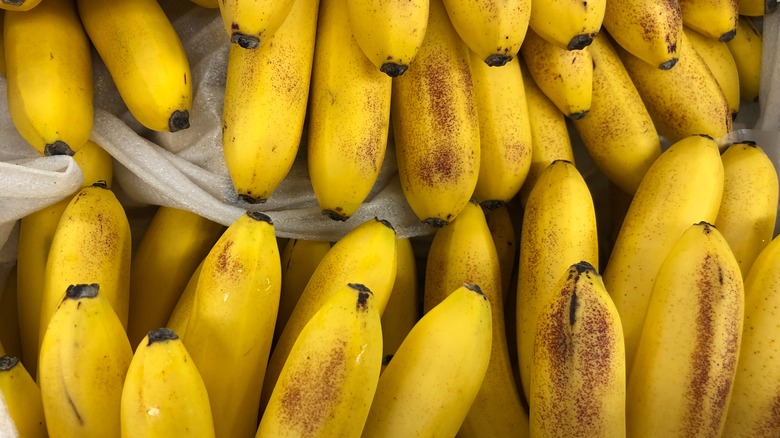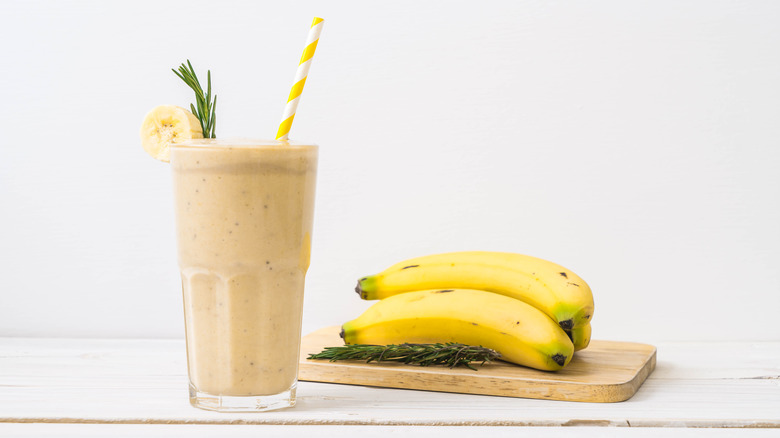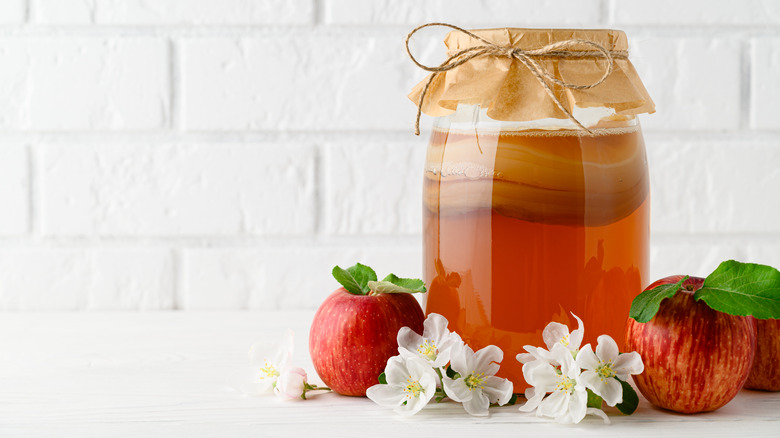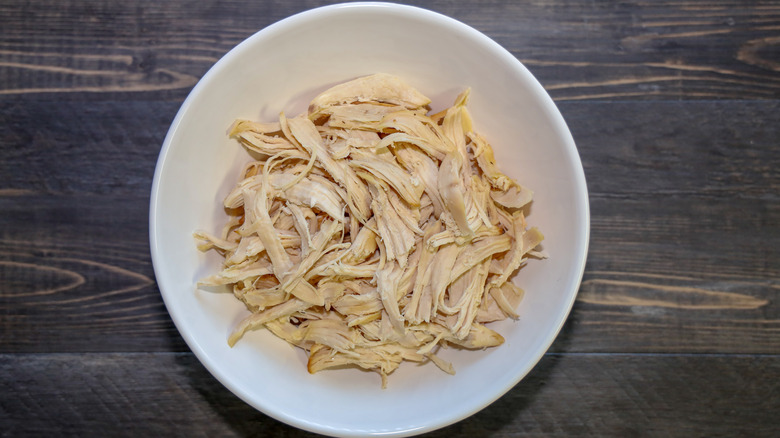7 Foods To Eat And 7 To Avoid If You Have An Upset Stomach
Picture the scene: You're rolling through life without a care in the world. Then one day, you try out a new restaurant you've never been to before. Everything goes without a hitch, you have a great time — that is, until six hours later, when you're hunched over the toilet bowl. Sound familiar? It's pretty likely that at some point or another, you've had this very experience. An upset stomach can strike when you least expect it, and can lead to some highly unpleasant consequences for your health.
There's a wide range of causes of an upset stomach out there, from more acute conditions like norovirus (which can cause vomiting and diarrhea, and affects an estimated 685 million people a year, per the CDC), to sometimes less extreme but no less irritating occurrences of indigestion (which can cause bloating, heartburn, and nausea, among other symptoms, according to the Cleveland Clinic). And when this happens, you don't want your diet to make you feel more sick.
Luckily, there are some canny food choices you can make when your stomach's not feeling tip-top to minimize any nasty side effects — and there are some foods you should definitely avoid, too, unless you want things to go south fast. Let's take a look in this article.
Eat: white rice
Just when you thought you couldn't love rice any more, your stomach starts feeling a little upset, and you realize that it's pretty much the perfect food to eat when you're feeling queasy. White rice is a go-to when you have an upset stomach, as its simple, low-fiber composition makes it a doddle to digest, according to registered dietitian Valerie Goldberg (via Women's Health Magazine). Rice is one of the essential staples of the BRAT diet, a diet recommended for those dealing with stomach flu and diarrhea, and which suggests eating bananas, rice, applesauce, and toast as part of a regimen of bland items to help ease you back into eating solid foods (per Medical News Today).
White rice is also particularly useful for any diarrhea caused by stomach upsets. According to WebMD, it's a binding food, meaning it'll help your stools to firm up faster. Just make sure you're sticking to simple white rice when you're feeling a little unsettled down there: More nutritionally complex kinds of rice like brown, black, or wild rice can cause your stomach to have to work harder to digest them, potentially causing further issues.
Avoid: sugary carbs
When you've had a troubled night's sleep due to an upset stomach, you might feel the impulse to get some quick energy going with some sugary treats. Before you reach for a candy bar, though, it might be useful to take a pause, as consuming sugary carbs on an irritated stomach could cause some unwanted side effects. As Georgetown University Hospital's gastroenterology division's assistant professor Robynne Chutkan states, eating larger amounts of refined sugar can cause a blood sugar spike that can produce unwanted clamminess and shakiness (via Health). It might not cause your stomach to become worse, but it could exacerbate symptoms of some types of stomach upset, like stomach flu, which can make you feel clammy and unsettled (per the Cleveland Clinic).
Too much sugar can also make symptoms of diarrhea worse, particularly if you're treating it in children, as research published in Viral Gastroenteritis discusses. It's useful to bear in mind that some foods which might seem healthy, like fruit juices or sports drinks, can be loaded with sugar, so make sure you check their labels first.
Eat: cooked vegetables
Okay, we guess Mom was right about vegetables, after all. Aside from the fact that eating vegetables regularly are good for you in pretty much every way, they also take center stage when your stomach isn't feeling at its best. Just make sure they're cooked, though.
Although your body would normally thank you for these nutrient-rich plants, it might not if you're eating them raw. "Cooking vegetables like carrots or spinach makes them easier to digest," says California-based registered dietitian nutritionist Jessica Stamm to Good Housekeeping, recommending that "they're perfect in egg scrambles or broth-based soups," which are simple, easier-to-digest foods.
When you cook vegetables like carrots, it reduces their pectin content, a type of dietary, soluble fiber the body can take longer to digest (via the Journal of Food Science). Without cooking your veggies, they can not only take longer to digest, but the fiber in them can stimulate the production of gas, making them less comfortable to eat when your stomach's not feeling right (per Medical News Today).
Avoid: broccoli
Broccoli should normally be on the top of your list to include in your diet: The nutrient-rich vegetable can provide benefits for anything from your heart health to your eyes to supporting your immune system, says registered nutritionist Nicola Shubrook to BBC Good Food. When your stomach's not at its best, though — especially if it's due to a stomach bug — this vegetable is best left off your plate until you're feeling better, according to The Oregon Clinic.
Unfortunately, the very thing that makes broccoli so good for you when you're healthy, its fiber content, can wreak havoc on you if your stomach's not in tip-top shape. Upon eating broccoli, "the fiber can reach the colon and be acted upon by the bacteria in our intestines, giving off gas in the form of methane, nitrogen and carbon dioxide," says the Southern Ohio Medical Center's senior medical director of gastroenterology Jesse P. Houghton to Livestrong. When you're dealing with a stomach illness, this gas is the last thing you need. It is possible to reduce the fiber content of broccoli by cooking it down significantly, but as Houghton says, doing so "will cause you to sacrifice some of the plant's important phytonutrients." Maybe just wait 'til you're better.
Eat: applesauce
When you're not feeling super well in the belly area, there's one jar you should reach for: that trusty container of applesauce. While it might not be the first thing you think of for an upset stomach, applesauce, a staple component of the BRAT diet, is ideal for when you're not feeling too hot.
Applesauce is an easily digestible food, providing necessary calories for your body when it may not be able to deal with many other dietary choices, Georgetown University Hospital's gastroenterology division's assistant professor Robynne Chutkan states to Health. Furthermore, applesauce can help ease symptoms of diarrhea, thanks to its lower level of roughage. Chutkan indicates that raw apples, conversely, can be useful for constipation if your upset stomach is caused by that, thanks to the skin's higher pectin content. However, it should be avoided if your bowel movements are loose.
Just bear in mind that the BRAT diet and the foods on it are not a long-term fix for an upset stomach. While it may be more comfortable to consume simpler foods in the immediate aftermath of a gastric upset, returning to a normal diet as soon as you're able to is essential, states WebMD.
Worst: citrus fruits
Citrus fruits are normally an excellent choice to snack on, supplying an ample source of vitamins (including vitamin C, natch), a great source of fiber, and potential benefits to your heart and brain health (per Healthline). However, try to avoid the temptation to have too many oranges when you've got an upset stomach, as they can be one of the worst things you can eat if you're having digestive issues (via Everyday Health).
It's all down to the citric acid present in higher quantities in citrus fruits, which can irritate the stomach lining — not the ideal situation when it's already feeling tender. The same thing can occur through eating tomato-based products, which are higher in acids. In fact, it's better to avoid acidic foods entirely when you're stomach's not feeling well, says the Lewis Katz School of Medicine's director of gastrointestinal endoscopy Benjamin Krevsky.
But there's one acidic exception that could help your stomach out when it's feeling a little funny. Drinking a small amount of apple cider vinegar could be the remedy you need, thanks to its ability to help firm up stools and promote good bacteria in your gut. Healthline says that this makes it potentially useful as a treatment for diarrhea, particularly if caused by bacterial infections. Just bear in mind that drinking too much apple cider vinegar could actually do more harm than good to an upset stomach — and it should always be consumed diluted, due to its high acid content.
Eat: saltines
There are few things more trusty than a simple cracker. And as it turns out, these simple foods are not only an excellent pairing for a cornucopia of toppings.
When it comes to eating on an upset stomach, simple crackers like saltines are your tummy's best friend, thanks to their easy-to-digest nature. When your stomach is unsettled and feeling queasy, "the bland nature of a cracker helps to satisfy hunger (excessive hunger can exasperate nausea) without the strong smells or tastes that may increase nausea," says registered dietitian and "Belly Fat for Dummies" author Erin Palinski-Wade to Everyday Health.
The starchy nature of a cracker "may also help to absorb stomach acids and settle your stomach," Palinski-Wade says, stressing that crackers should be eaten slowly if you're not feeling well to avoid overwhelming your digestive system. Saltines and other salty crackers are particularly useful for really bad gastric episodes, as their higher sodium content can help replace essential salts and electrolytes lost through diarrhea, according to Insider.
Avoid: fried foods
It's likely that if you're dealing with an upset stomach, that burger you normally crave is pretty far from your mind. But in case you're able to convince yourself that fried food is a good choice when you're not feeling your best in the stomach area, we'd advise against it. Fried foods act pretty efficiently when it comes to making your upset stomach feel even worse, as WebMD says.
The reason for this, as you might expect, is due to the higher fat content of fried food. "Fried foods are more difficult to digest due to the fat they contain," thanks to the chemical molecule of fat being bigger than others, says registered dietitian and "The Everything Mediterranean Diet Book" author Connie Diekman to Livestrong. "Since fat does take longer to digest than other foods," says Diekman, "the discomfort of a high-fat meal can linger longer than we like" — something which you don't want to have to think about if your stomach's already not feeling its best. What's more, fried foods and other high-fat foods can act as a trigger for gastrointestinal issues like heartburn and indigestion.
Eat: bananas
Bananas, we praise you. This nutrient-rich, blood-sugar-benefiting, digestive-health-supporting fruit (per Healthline) is not only good for you pretty much any day of the year. On days where you're feeling your stomach a little too much, a banana could help.
The B in the stomach-friendly BRAT diet, bananas can help deliver the nutrients you need without aggravating your stomach too much due to being easy to digest and containing a natural antacid effect, Medanta states. What's more, eating bananas can help to stimulate the production of stomach mucus, easing feelings of irritation down below.
The composition of bananas is also ideal for when you're losing valuable nutrients from your body due to sickness, particularly diarrhea. Diarrhea due to stomach upset or other illnesses can cause dehydration and the loss of essential nutrients, salts, and electrolytes like potassium (per the Cleveland Clinic). Due to their potassium-rich nature, bananas can be the perfect food to replenish lost nutrients, alongside other simple foods like the other parts of the BRAT diet and oatmeal, plain chicken breast, and boiled or baked potatoes, according to Donald Kirby, Cleveland Clinic's Center for Human Nutrition director.
Avoid: banana milkshakes
While bananas may be the ultimate food choice for when you've got an upset stomach, that banana milkshake may not have the same effect. Milkshakes and other dairy products could be the last thing you need when your stomach's feeling unsettled, thanks to the lactose present in dairy foods (per Everyday Health). While some people can tolerate dairy without a problem, oftentimes lactose can produce gas or bloating (most notably in people with lactose intolerance). And if you have too much of the stuff, it can end up worsening diarrhea.
What's more, milkshakes and other dairy products are generally higher in fat, which can cause further issues around upset stomachs. As research published in Advanced Biomedical Research indicates, eating fatty foods can make dyspepsia symptoms worse, and pulling back on eating fats could be a useful course of action if you're feeling symptoms of indigestion. There are some situations where dairy products could help your upset stomach, though: Unflavored low-fat yogurt, with its probiotic-rich qualities, may help to relieve an upset stomach and symptoms of diarrhea, says Medanta.
Drink: kombucha
When you're dealing with symptoms of an upset stomach, trying to consume more things may be the last thing on your priorities list — but making sure you get enough fluids is essential to keep dehydration at bay, particularly when your stomach upset is accompanied by diarrhea or vomiting (per WebMD).
What you drink, though, is important, and some drinks can offer way more benefits than others. That's where kombucha comes in, as a drink that not only helps you rehydrate but can also deliver some awesome probiotic benefits. As registered dietitian Valerie Goldberg states, kombucha could be an even better drink than a classic ginger ale for an upset tummy, thanks to being lower in sugar and high in probiotics (per Women's Health Magazine). This helps to bring down inflammation in the stomach and contributes to your gut's microbiome.
In fact, consuming probiotics (either through kombucha or other gut-friendly foods) can help with a range of stomach issue causes (such as food poisoning, viral causes like gastroenteritis, and irritable bowel syndrome) by helping your gut flora return to full health, according to Optibac Probiotics.
Avoid: alcohol
It's likely that if you've got an upset stomach, drinking alcohol isn't top of your priorities list. But if you're only feeling a little unsettled in the belly area, it can be all too easy to convince yourself that a few drinks wouldn't do too much harm, right?
Well, you might want to think again. When you have an upset stomach, drinking alcohol is probably one of the least clever choices you can make, due to alcohol's effect on the production of stomach acid (per Drink Aware). When we drink alcohol, our stomachs are prompted to produce more acid, which can then make our stomach lining become inflamed (or become even more inflamed if you're already dealing with a tender tummy). This can lead to unpleasant symptoms like vomiting and diarrhea, as well as acid reflux.
As New York-based gastroenterologist and internist Niket Sonpal says, drinking alcohol also damages your stomach bacteria "so we ended up getting a mismatch of the microbiome as well" (per Well+Good). In addition, alcohol consumption causes dehydration, which can lead to stomach issues like constipation. Need more science-backed reasons to limit alcohol for your stomach's sake? As research published in Medical Science Monitor points out, drinking alcohol regularly can increase your risk of developing gastric cancer.
Eat: lean protein
It can be hard to face food when your stomach's not feeling at its best, but sooner or later, you're going to have to eat something. And lean protein can be a fantastic choice to get your body back to good health, thanks to being simple enough for your body to process. "When your stomach is upset, you want to make sure you're doing everything to mitigate the symptoms and feel better. You want easy-to-digest food," says registered dietitian Valerie Goldberg to Women's Health Magazine. "It's best to avoid anything high in fiber or fat, and to stick with simple carbohydrates and lean protein sources that the body can break down easily."
As such, it's best to steer away from protein sources that have too much fat, like fatty red meat or certain cuts of chicken, and stick to white meat like chicken breast (per Verywell Health). Certain types of fish and leaner cuts of turkey, beef, and pork are also good choices to eat and give your body the easiest ride when it comes to digestion.
Avoid: spicy foods
Ah, spicy foods. So, so delicious, and so, so problematic for our stomachs. While you might be the type of person who can tolerate spice when you're feeling normal, when you have an upset stomach, it's best to keep spicy foods at bay until you're better — not the least due to certain spices' potential to produce diarrhea (via Verywell Health).
Diarrhea and other stomach symptoms like pain and discomfort are caused by the presence of capsaicin, a compound which gives spicy foods their heat. Capsaicin is an irritant — and when you eat foods containing it, it not only delivers heat but can end up aggravating your stomach lining and intestines. When this happens and the pain receptors in your gut are triggered, your digestive system senses danger, and then starts to rush the capcaisin through your system. In other words, you'll end up needing to go to the bathroom quicker ... with some less-than-solid results.
That said, this doesn't occur with everyone, and some people's stomachs are more capable of handling the heat. But if you already have an upset stomach, the capsaicin will only serve to make things worse.


